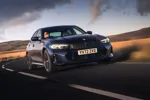Almost half of UK motorists are seriously distracted by in-car technology whilst driving.
Although mobile phones and satellite navigation systems are often touted as the top distractions, the RAC's latest Report on Motoring found the main culprit is more familiar technology:
- Over half of drivers (54%) said 54% they have been seriously distracted by their radio, CD or DVD player, with the 17-24 year old age group again proving the most affected (63%).
- Just over one third (35%) said their cars’ heating and air conditioning controls force them to take their mind and eyes off the road.
- A similar number also said the same of their satellite navigation system and mobile phone.
David Bizley, RAC's technical director said: "In-car technology has come a long way since the late 1980s.
"The advances have fallen into two camps - active and passive.
"Active technologies such as in-car entertainment are not always positive as they can cause driver distraction, while passive technologies, such as anti-locking brake systems (ABS), are undervalued as they are not fully understood or deemed less important as they come on automatically."
The report found that while ABS and immobilisers are fitted as standard on new cars by law, only 70% of motorists knew that they had ABS, whilst only 68% knew that they had immobilisers.
As cars get more technologically complex, it is imperative that comprehensive hand-over procedures are in place so that company car drivers are fully aware, before they driver their new car, what technology is fitted and how it works.
They also need to refer to the owner’s manual to learn about warning signals on the dashboard.
These are meant alert drivers to potential problems, but it seems they are also leading to confusion over what all these signals mean, for example only half of drivers recognise the symbol for an airbag.
Mr Bizley added: "Technology has always been a key feature of the car, but there have been some real leaps when it comes to the computers and electronics involved.
"While these technologies have improved car safety in many respects, and improved the in-car experience of the driver, they do have their drawbacks - namely distracting the motorist while driving and confusing them when it comes to the number of warning signals which can be found on dashboards.”
The RAC is now calling for a Europe-wide standard for dashboard display symbols and lights.
It also said owner’s manuals should be written in a more consumer friendly style with downloadable quick user guides for the second hand market.















Login to comment
Comments
No comments have been made yet.